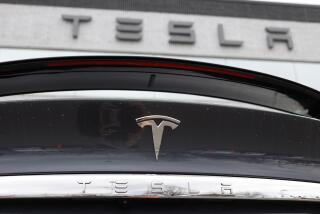Toyota raising prices on some U.S. models
- Share via
TOKYO — Toyota Motor Corp. is raising prices on some U.S. models this month amid increased worries about its profit growth in the American market.
The price increases, which will start in the middle of May, include a hike of $200 on the 2008 Yaris sedan, boosting the cost of the base model to $12,425, with higher prices for models with extra features. The 2009 Camry will go up $200 to $18,920 for a model without any extras, the automaker’s U.S. unit said.
The base hybrid Camry, introduced as a 2007 model in late 2006, will cost $300 more at $25,650, Toyota said.
Toyota is also raising the U.S. prices of some Lexus luxury models.
Like other Japanese automakers, Toyota is enjoying sales growth while U.S. automakers are struggling. Soaring gasoline prices have increased demand for smaller, fuel-efficient cars that Japanese automakers are reputed for.
Toyota faces a challenge in maintaining profit partly because of the recent decline in the dollar, which erodes the value of overseas earnings of Japanese exporters. Worries are also rising about how a U.S. economic slowdown might hurt sales.
Toyota is set to release financial results today, when it could report its first profit drop in nearly a decade.
But it’s still faring better than its U.S. rivals. General Motors Corp. lost $3.3 billion in the first quarter. Ford Motor Co. had a surprise profit of $100 million for the same period but expects to lose money this year as the U.S. auto market deteriorates.
Atsushi Kawai, auto analyst with Mizuho Investors Securities in Tokyo, said the price increases of about 1% wouldn’t make up for the damage Toyota’s bottom line was expected to suffer from the weak dollar. The dollar, trading at about 114 yen last year, fell below 100 yen in March and is now trading at around 105 yen.
But he noted that Toyota raises prices about this time every year and that the hike was routine.
“Outside people are the ones giving special meaning to the decision” because of the concerns about the U.S. market, Kawai said.






